1. The Permanent Peoples’ Tribunal in Mexico
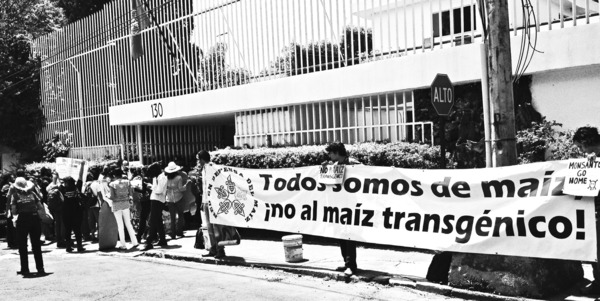
In requesting the PPT’s intervention in Mexico, the petitioning group of organisations, communities and persons declared: “In light of the dense legal thicket enveloping us, it’s urgent for us to find an authority that actually goes beyond the international institutional framework. An authority that would be truly independent and allow us to document in a comprehensive, open (but nonetheless rigorous) fashion every type of grievance.”1
The problem is structural, systemic and complex. It was aggravated by the structural adjustment policies of the 1980s to the point where it acquired an irreversible character with free trade agreements and their train of “phase-in” or “review” clauses. In this analysis, the Mexican State is committing a “deviation of power” because “it creates space for corporations while preventing the population from achieving justice through legal or institutional channels. In effect, State bodies are impenetrable, the legal issues are mired in confusion, and public policies, constitutional reforms and laws are confected to abrogate collective rights, infringe on the commons and weaken the social pact.”2
The PPT’s Mexican chapter identified free trade as the core element of a systemic dynamic in which the law is subservient to the economic interests of sectors distant from the general population. The 2011-2014 PPT session as a whole is therefore entitled “Free Trade, Impunity and Peoples’ Rights in Mexico.”
Over a three-year period, Mexican civil society documented seven processes summarising an unsustainable situation: generalised violence (tens of thousands of disappeared, repression, militarisation, imprisonment and over 100 thousand assassinations); environmental devastation; precarisation of workers’ rights and repression of independent unions; gender violence and hate crimes; expulsion/inexorable migration; absence of press freedoms and violence against journalists; and the comprehensive attack against peasant life, food sovereignty and collective land tenancy. It is this seventh process that is the subject of the present document.3
In 2013, various communities and organisations – most of them close to the Red en Defensa del Maíz (Maize Defence Network) and the Asamblea Nacional de Afectados Ambientales (National Assembly of Environmentally Affected Parties) – held workshops in diverse regions and localities to systematically document the grievances arising from: the State’s abandonment of agriculture without concern for the problems of peasants and farmers in rural areas; policies undermining the indigenous peoples and peasant life; the destruction of tenancy systems and of the territories maintained by communities, subsistence and decent living conditions in communities; the voracity of the agroindustrial food system; and of course the irresponsible policy of promoting GM maize and the massive imports of maize of dubious quality for industrial uses.
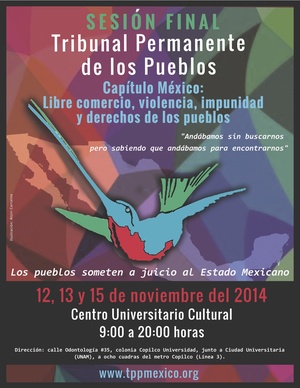
All testimony provided ample evidence that the so-called structural reforms and international public policies promoted since the eighties are responsible, in conjunction with constitutional changes and reforms to laws and regulations, for the dismantling of legal and institutional protections at the expense of peasant communities. The subordination of Mexican agriculture to the interests of an industrialised global food system dominated by a few transnational corporations, the disempowering of the peasantry to the point where it isn’t profitable for them to produce their own food and the interruption or erosion of the living process of creating agricultural and cultural-social biodiversity are all direct effects of these policies and free trade agreements (which function as padlocks to make them irreversible).
The corporations of the global food system are unforgiving to farmers, whether subsistence or commercial farmers, who seek to make a living from agriculture, even under the rules imposed by the dominant model. They are marginalised “as profit rates fall and the corporations act to cut the throats of any who should impinge on their financial stability.”4 Consumers in both cities and rural areas are affected as they may no longer choose their own food having become the prisoners of public policies and the designs of corporations.
It is a situation of structural violence, a process of dismantling rural environments, social property, peasant life and the possibility of people feeding themselves. Everything to ensure that transnational companies obtain legal certainty and the opportunity to accumulate vast tracts of land or establish oligopolies in key market sectors, such as seeds or grain purchasing and distribution, grain processing and retail sales. The result: a vast forced rural exodus and the inexorable growth of cities with, in turn, repercussions in the form of further aggravation of the problems in the countryside.
2. The rulings and visions
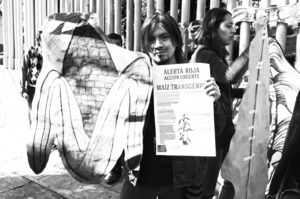
Mexico’s insertion in neoliberal globalisation has been associated with an extraordinary increase in suffering for the Mexican people. Neoliberal globalisation generates strong imbalances between the market and human rights. As the economy globalises, the democratic institutions safeguarding the majority’s rights are subordinated and marginalised; globalised institutions substitute for democratic control via the opaque regulation of international trade.
Neoliberal law provides a framework for wealth accumulation and the concentration of economic and political power required to meet the challenge of eliminating the “losers.” Moreover, neoliberal law is based on the architecture of impunity constructed in favour of multinational companies and capital. Inequality and asymmetry are integral to this process.
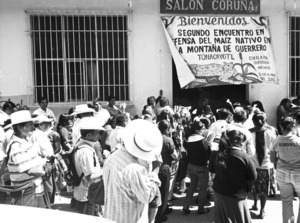
In November 2013, the final hearing on Violence against Maize, Food Sovereignty and Peoples’ Autonomy declared in its ruling:
There is an open war, of a criminal character, against the autonomous subsistence of broad groups, including, notably, the indigenous peoples and peasant communities. In dispossessing them of their independent means of subsistence, one condemns them to migration, dependence on assistance programs, misery, marginalisation and death... The imposition of an intensive agroindustrial model –which includes transgenics as one of its most extreme elements – by the Mexican State and corporations such as Monsanto, Syngenta, Dow, BASF or Cargill, not only constitutes an attack against a culture, but also a veritable war against subsistence, spearheaded via the confection of laws to prevent the defence of peasant agriculture and independent [food] production.
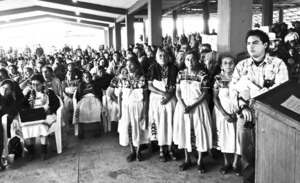
The various organisations and communities presented their cases with a comprehensive and panoramic vision of the significance of this attack for agriculture and independent food production. The rulings reflect the force with which this comprehensive vision was presented throughout the PPT process.6
The evidence emerging from the cases presented (by groups and communities) led to the identification of a central grievance revisited in both the final ruling of the general hearing of November 2013 and the PPT’s final sentence in November 2014. This central grievance received the imprimatur of the work of philosopher Jean Robert and that of Ivan Illich.7 As the adjudicators of the Tepoztlán pre-hearing put it:
The objective of the attacks [by corporations and government] is total dispossession, i.e., wresting from the people their knowledge, their forms of constructing their own vision, meaning and ways of doing things, their ways of living together and, of course, their means of subsistence. This with the objective of turning us into isolated individuals, without social ties, unrooted to a place, to the land or to a neighbourhood, dependent on work to eat, thereby leaving us with no other alternative but to become submissive, cheap and disposable labour.8
3. The grievances
The general indictment sought a comprehensive perspective as a method for interconnecting the different elements of the process. The rulings echoed this comprehensive perspective, which not only sought to elucidate specific cases but also to disentangle the system’s dynamics and structure.
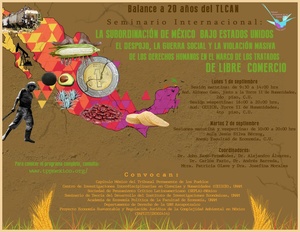
2. Nor are the rights of the indigenous peoples recognised. They are merely recognised as entities of public interest. To recognise their rights to autonomy and territory would require the Mexican State’s prior recognition of the Indian peoples as subjects of public law. In light of the designs of companies, governments and multilateral organisations – i.e., land grabs, privatisations and plundering – it was crucial to NOT recognise any possibility that indigenous peoples have rights, that is to say possess instruments of legal defence.11
3. Withdrawing support for independent food production weakens national sovereignty and food security for the population as a whole, and it undermines the country’s economic foundations and strategies. Meanwhile, the big corporations repeatedly obtain every facility to produce, import, market and/or promote the processed foods they manufacture using their own supply channels of raw materials.12
4. Support for industrial farming means implanting forced dependency. Technological packages make farming dependent on highly toxic chemicals. They also erode the soil and can make farming too costly to be profitable.13
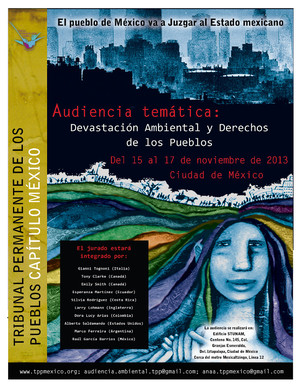
When the Green Revolution was extended to peasant areas and maize, it was central to a policy that strove explicitly to expel peasants from the land to create a supply of cheap workers for cities already undergoing an accelerated process of industrialisation. At the same time, the utilisation of hybrid seeds and the associated agrochemical inputs was progressively extended to rain-fed agricultural areas, traditionally cultivated with native seeds.14
Maintaining high yields can only be achieved through predatory land use, which consumes lot after lot, and ruthless land grabbing, premised on the notion that everything is disposable. Standards are imposed. In effect, quality standards, food hygiene and other “technical” criteria such as “good agricultural practices” (GAP), NOMs, Premium Quality, etc. are invoked to marginalise “unregulated” foods, thereby privileging food produced under corporate control, although in practice such foods may be much more harmful than foods produced by traditional small farming.15
5. The war against subsistence leads to the privatisation of knowledge and discoveries, which leads to even privatising life itself. Intellectual property, patents, plant breeders’ rights and the entire panoply of associated notions such as certification, registry and cataloguing (of plant varieties for example) are established to expressly criminalise the ownership and free exchange of native ancestral seeds.16 Corporations and various associations promote this criminalisation, in complicity with states and international organisations, through systems of laws designed to exclude all seeds NOT registered and certified by them. In their verdict at the final Maize hearing, the jury members observed: “laws and the judicial apparatus are being used to mock legal principles and peoples’ fundamental rights. The Seeds Act of 2007 makes a crime of what peoples have done for millennia to husband, improve, multiply and share their seeds.”17
6. GM crops are the greatest weapon against independent food production. They entail genetic control codified by legal frameworks for intellectual and industrial property. In the last fourteen years, the government has adopted a variety of contamination strategies. First, it intentionally penetrated the regions with transgenics, but in underhand ways. Then it minimised the effects of GMOs, enacted laws to promote them, denied Mesoamerica’s status as the centre of origin of maize, terminated the moratorium against transgenic maize and commenced authorising permits for pilot projects and experimental sowing of transgenics in northern Mexico.18 In various pre-hearings, scientific evidence and community monitoring results were presented to demonstrate the dispersion of transgenic contamination of peasant maize and cotton in various places in Mexico (the centre of origin of both crops). Another case was that GM soybeans have contaminated honey. The short and long-term effects of this transgenic invasion are catastrophic for biodiversity, agriculture, food production and people’s health, and not just for Mexico, but for the entire world, as maize is one of the world’s principal food crops.19
In its final sentence the PPT declared: “The Mexican government must adopt all necessary measures to guarantee the conservation of native maize as a principal staple food and as a cultural element of social cohesion and organisation. As Mexico is the genetic reservoir of this pillar of world food security, the sowing of transgenic maize in the country must be prohibited.”20
In 2010, Pat Mooney, director of the ETC Group affirmed: “If you lose the battle in the centre of origin of maize, then we will lose the centres of origin of agricultural diversity everywhere in the world. We cannot win if you [Mexicans] lose.”21
In the ruling rendered at the pre-hearing in San Luis Beltrán, Oaxaca, an analysis was effected concerning how the scientific establishment colluded in maize contamination, seeking to make it irreversible. The adjudicators gathered evidence on “how certain parties engaged in falsifying testing, methodological abuses, dishonest presentation of results and the withholding of information. In effect, an authentic conspiracy was constructed in which government officials, private corporations and supposed scientists realised criminal activities to withhold information on transgenic contamination.”22
After several attempts dating back to October 2012, on 5 July 2013, a group of civil society organisations, scientists and lawyers filed a class action suit against the sowing of GM maize in Mexico. This suit resulted in “a precautionary measure authorised on 17 September 2013 which required the suspension of GM maize permits for the duration of the trial”. Thanks to this measure, all permits for the sowing of GM maize throughout the country were suspended by a court order.
The injured parties allege that the Mexican State is guilty of deviation of powers as several government agencies and five companies “have brought 73 challenges against the suit and precautionary measure, as of 17 September 2014, including appeals and applications for review, revocation, the judge’s recusal, as well as amparo actions.”23 Governmental agencies have no hesitation in supporting corporations in instituting an instrument of control that automatically privatises not only a particular variety but also entire species and, in the long term, agricultural activity as a whole. The legal actions of the government and the corporations, and the deviation of power implied, are intended to stop civil society mobilisation as well as the suspension of GM maize sowing.
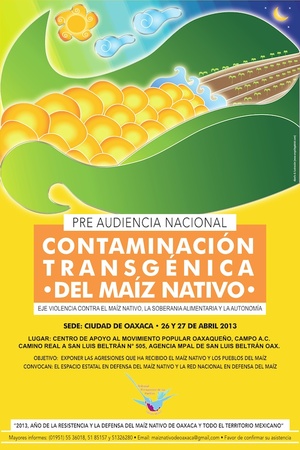
8. An expulsion of waves of human beings from their own territories is ongoing, which cuts off persons and collectivities from their roots and means of subsistence. This forced exodus to cities or agroindustrial centres engenders trafficking in persons for cheap labour as day workers or ordinary workers. Cities swell with the influx of rootless populations bereft of economic security. This in turn increases urban demands on rural areas, thereby exacerbating a rural-urban vicious circle.25
9. Forced rural exodus entails an emptying of territories and leads to their invasion by mining firms, deforestation and fraudulent speculation schemes, including carbon and oxygen as environmental services, REDD, biosphere reserves, etc. Such schemes alienate land-use management and turn communities’ ancestral environmental stewardship into a basis for speculation.26
10. Corporations are taking over the entire food production chain. The distance between where food is produced and where it is consumed is growing. A “vertical integration” of the agro-industrial food system is being imposed. This encompasses land grabs, the production and use of laboratory seeds (including GM) with toxic agrochemical packages, soil use changes, the devastation-deforestation-monopolisation-abuse of soils and water, and the transportation, processing, packaging, warehousing and delivery to corporate food marketing chains. Food safety, prices and food access are negatively affected. Local markets are dismantled in favour of agrifood corporations and major supermarket chains, thus fracturing regions and their most deeply rooted patterns of exchange.27
11. Extreme violence is brought to bear on many long duration historical processes of great importance to communities and peoples. Threats, coercion, jailings, disappearances and assassinations are increasing against community leaders and members of civil society, peasant and indigenous organisations, at the hands of paramilitary groups and hired assassins backed by agribusiness, mining, forestry and infrastructure companies, among others, in order to terrorize or disappear opponents.28
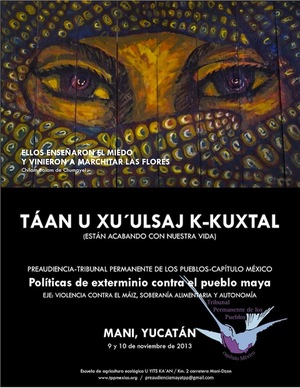
There is a much broader process of land grabbing and seizure of the commons, of social, environmental and territorial destruction and of annihilation of social fabrics, which is part of an orchestrated plan to displace populations and empty territories. This process of dispossession also includes a mechanism to destroy the communal fabric of the indigenous peoples by fomenting division in communities and co-opting leaders. [...] Sometimes an accomplice, sometimes the driving force, it is nearly impossible to clearly distinguish the State and its interests from those of land coveting national or foreign businessmen.29
In November 2013, a sentence was rendered at the final Maize and Food Sovereignty hearing, which ruled that the harms afflicting communities “are effected through diverse forms of systemic violence, with the apparent object of fomenting deep and generalised terror, thereby creating an environment of chaos and provoking confusion and continuous uncertainty.”30
But the people resist. They gain perspective. They understand that “today, peasant and indigenous communities and small scale farmers produce most of the world’s food,” despite the small share of the world’s land in their care, and despite the efforts to impose oppressive conditions on them.31
The Permanent Peoples’ Tribunal process opened multiple spaces and networks where the assembled participants reflected on and analysed what was happening to them. This process was about collectively understanding how to transform the conditions burdening them. Communities are reassessing the role of local agriculture, their own independent production, and “ancestral crops and native seeds.” They endeavour to keep their young people in their communities and regions to ensure that the critical mass of people who act and think as a community are not wasted, lost or broken. They know that they must, whatever the cost, open and strengthen spaces for assembly, community and reflection (as a focal point for the collective creation of knowledge and general understanding of the world and the tasks ahead). And they know that local and regional ties must grow and strengthen.
1 Petitoria formal al Tribunal Permanente de los Pueblos, Fundación Lelio Basso, Rome, Italy, encaminada a instaurar un Capítulo México donde podamos ventilar los nexos entre Libre comercio, guerra sucia y derechos de los pueblos, Comité promotor del Capítulo México, February 2011. See also the Universal Declaration of the Rights of Peoples, adopted in Algiers, 4 July 1976.
2 Ibid.
3 The seven PPT processes against the Mexican State served as an instrument for a surprising reflection/collective systematization process and a local-regional-national linking up from below, rarely seen. Over a thousand local, regional and national collectives presented 500 cases and countless witnesses testified in 25 of the country’s states, during 11 hearings, 40 pre-hearings and close to 150 systematization workshops. For information on the entire process: www.tppmexico.org
4 “Los devastadores efectos de una guerra sostenida contra la subsistencia de los pueblos,” indictment made in Process 5, Violence against Maize, Food Sovereignty and the Autonomy of Peoples, at the Permanent Peoples’ Tribunal, Mexico City, 19 November 2013
5 Permanent Peoples’ Tribunal, Final Sentence rendered re the Free Trade, Violence, Impunity and Peoples’ Rights process in Mexico (2011-2014), Mexico City 12-15 November 2014. http://www.internazionaleleliobasso.it
6 Permanent Peoples’ Tribunal, pre-hearing in Tepoztlán, Colisión campo-ciudad, 24 November 2012; pre-hearing in San Luis Beltrán, Oaxaca, La contaminación transgénica expresa encontrada en el maíz nativo mexicano, April 2013; pre-hearing in San Isidro, Jalisco, Territorialidad, subsistencia y vida digna, 28-30 June 2013; pre-hearing in Maní, Yucatán, Políticas de exterminio de del pueblo maya, 10 November 2013; pre-hearing Cultivos transgénicos, el caso de México con énfasis en el maíz, Mexico DF, 12 November, 2013; See complementary hearing in Acatepec, Hidalgo, Devastación de la vida comunitaria, November 2013. www.tppmexico.org
7 Jean Robert, “Por un sentido común controversial”, in GRAIN (compilation), No toquen nuestro maíz, June 2014. See Iván Illich, El trabajo fantasma. Complete Works, Tome 2, FCE, Mexico, 2008.
8 See note 6: Dictamen presentado en la Preaudiencia: Colisión Campo-Ciudad, Tepoztlán, Morelos, op. cit.
9 See Tenencia de la tierra y derechos agrarios (pdf), December 2003. http://www.sagarpa.gob.mx/sdr/evets/sm_jovenes/pdfs/1_eirr_sra.pdf.
10 Centro de Estudios para el Cambio en el Campo Mexicano and GRAIN: Reformas energéticas, despojo y defensa de la propiedad social de la tierra en México, biodiversidadla.org, 2014.
11 “El Estado mexicano no reconoce los derechos de los pueblos indios”, Ojarasca 178, February 2011.
12 Ana de Ita, “La seguridad alimentaria como negocio”, La Jornada, 28 April 2012. GRAIN; “Flujo de alimentos y TLC”, October 2008, and GRAIN, “Corporations are still making a killing from hunger,” January 2009. [http://www.grain.org/article/entries/716-corporations-are-still-making-a-killing-from-hunger]
13 See “Permanent Peoples Tribunal Verdict against the Big six Agrochemical Companies: Syngenta, Bayer, Monsanto, Dow, Dupont, Basf”, Bangalore, India, December 2011, http://www.gloobal.net/iepala/gloobal/fichas/ficha.php?id=17107
14 Permanent Peoples’ Tribunal, Dictamen sobre Violencia contra el Maíz, la Soberanía Alimentaria y la Autonomía de los Pueblos, third thematic hearing as part of the Free Trade, Violence and Peoples’ Rights in Mexico process (2011-2014), Mexico, 19-21 November 2013. See www.tppmexico.org.
15 GRAIN, The great food robbery, GRAIN, 2013 [http://www.grain.org/article/entries/4501-the-great-food-robbery-a-new-book-from-grain]
16 Alianza Biodiversidad, Red por una América Libre de Transgénicos, Campaña Mundial de la Semilla de Vía Campesina, “Declaración de Yvapuruvu”, www.biodiversidadla.org. Alianza Biodiversidad, Leyes de semillas y otros pesares, October, 2014. [http://www.grain.org/es/article/entries/5002-leyes-de-semillas-y-otros-pesares-los-pueblos-de-america-latina-las-cuestionan-e-impugnan]
17 Dictamen sobre Violencia contra el Maíz, la Soberanía Alimentaria y la Autonomía de los Pueblos, op. cit.
18 ETC Group, El año de la gran contaminación, October 2012, http://www.etcgroup.org/es/node/185
19 ETC Group, The Great Mexican Maize Massacre, press release 15 November 2012 http://www.etcgroup.org/content/great-mexican-maize-massacre
20 ETC Group Comunique, “International Tribunal Demands GM Maize Ban in Mexico,” 5 December 2014. http://www.etcgroup.org/content/international-tribunal-demands-gm-maize-ban-mexico
21 Pat Mooney (ETC Group), “La FAO contaminada transgénicamente”, in GRAIN, Coa, Casifop, El maíz no es una cosa, es un centro de origen, México, 2012.
22 See note 6: ruling on Contaminación transgénica del maíz nativo, San Luis Beltrán, Oaxaca, op. cit.
23 Addition to the document “De la simulación de protección de la diversidad del maíz al desvío de poder a favor de las transnacionales,” made during filing of the class action lawsuit against GM maize in Mexico and filed with the Permanent Peoples’ Tribunal, Mexico chapter, September 2014. www.tppmexico.org
24 Andrés Barreda, “La catástrofe del agua en México sólo la explican las políticas del TLC,” Ojarasca 178, February 2012.
25 Final sentence of the PPT, November 2014, op.cit,
26 Ibid.
27 The great food robbery, op. cit.
28 See note 6, Dictamen de la Preaudiencia: Colisión Campo-Ciudad, op. cit.
29 See note 6, Dictamen de la preaudiencia de Políticas de exterminio contra el Pueblo Maya, Táan U Xu'Ulsaj K-Kuxtal, Maní, Yucatán, op. cit.
30 PPT, Dictamen sobre Violencia contra el Maíz, la Soberanía Alimentaria y la Autonomía de los Pueblos, op. cit.
31 ETC Group, “Who Will Feed Us: The Industrial Food Chain or Peasant Food Webs?” http://www.etcgroup.org/content/poster-who-will-feed-us-industrial-food-chain-or-peasant-food-webs, 2013. GRAIN, “Hungry for land,” http://www.grain.org/article/entries/4929-hungry-for-land-small-farmers-feed-the-world-with-less-than-a-quarter-of-all-farmland